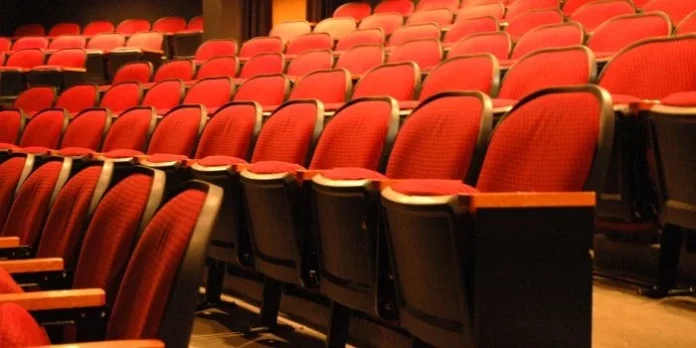Following its inaugural production in July, Vancouver’s Midtwenties Theatre Society returns with the premiere of its first original theatre production, Above The Hospital.
Presented in association with Red Gate Arts Society, Above the Hospital is a topical piece touching on Vancouver’s housing crisis, and the role of art and artist in today’s society.
The play story follows two lower-class Vancouver millennials – the rational nursing student, Lauren, and her older aspiring musician-boyfriend, Cameron – who live together in an overpriced, tiny apartment above a hospital. A casual evening of sex, pot, and talk turns into a night of drinking, arguing, and reminiscing, until unexpected guests arrive at the door, forcing the two to re-examine themselves in the face of an unknown future.
In this Q&A we find out more about Above the Hospital from writer and director, Beau Han Bridge.
This interview has been edited and condensed.
Why this story now?
Above The Hospital is a story with specific characters and themes that will likely resonate beyond any year, but we didn’t want the 2017-specific themes to be passed over, such as social isolationism among millennials, and housing in-affordability. Both are topics that, in my opinion, will always be connected to the year 2017. It is essentially a play that depicts the mid-twenties life crisis within the context of a relationship built on artistic dreams and aspirations.
Does the play come from any personal place for you?

Yes. It was about five years back when the concept of this play became apparent in my mind. Although the narrative and characters depicted in the play are fairly fictional and exaggerated, the essence of the material was drawn heavily upon a single-evening I had visiting some friends who lived in a tiny apartment, above a clinic on Main and Broadway.
Among my friends were this lovely couple that consisted of an aspiring musician and a nursing student. We proceeded to get very drunk and the talk inevitably led to subjects such as the feasibility of pursing a career in the arts, the role of an artist, and how necessary the arts were in a rapidly changing society.
How would you describe Above The Hospital? Is it a comedy, drama, or something else?
I would say that it is about 80% drama, and 20% comedy. The comedy is scattered like sprinkles on a cake, but the majority of the audience will take it away as a drama. Like Edward Albee’s Who’s Afraid of Virginia Woolf, it just passes the threshold of being categorized as a dark comedy to being a drama.
Is Above The Hospital also a comment on Vancouver’s housing crisis?
Among the themes that are explored, the expense of living in Vancouver is definitely a huge factor driving the narrative. I wouldn’t say that the play is a direct response to it, but I think if you are to write any story about young adolescents living in Vancouver today, it would be impossible to ignore the fact that our city is very expensive to live in. It is a factor that is greatly affecting millennials attempting to establish careers in artistic-related industries and others.
I would even argue that if it weren’t for how expensive Vancouver is, the conflict of the play could possibly have been avoided altogether, but that’s up to the audience to think about after they see it.
An original piece for any theatre company can be risky – why did you decide it was time to produce an original piece?
I agree that it is a risky move, however, from the experience of doing This is Our Youth back in July, I learned a million lessons and one of the primary ones was that every project that you take on will always be a huge risk, no matter what you do.
When I set out to establish Midtwenties, our goal was to introduce original stories that explore specific themes of millennials and our society today. This is still our primary goal, but at the time of debuting the society, every theatre-book I read was telling me that a theatre company should avoid debuting with an original. Therefore, we decided to do This is Our Youth. It not only provided an essence to the type of shows we hope to produce, but it validated to audiences and critics that we have the talent and muscle to actually produce a show that is worthwhile and meaningful.
I also didn’t want people to forget what our actual intentions were in the first place, to introduce original works.
You are director as well as playwright – would you trust anyone else to have directed or does this give you complete control on how the story is told?
The great thing about being the writer of your own play is that you do have control of the narrative’s foundation. Like This is Our Youth, there are elemental boundaries that you cannot change because they are the staples of the play’s core. That is what I made sure to do for Above The Hospital, so actors could have a freedom to explore without the risk of telling a different story.
I would not have trusted anyone to direct this one specifically because I want to make sure that the interpretation evokes a tone of theatre that I want people to associate specifically with Midtwenties. There is a certain way that one can do Above The Hospital, but as we are still in the midst of growing our crew, I have to continue laying a foundation until it’s solid. In the future I would be very open to other’s directing works written by me, and for Midtwenties, but I’ll bite the bullet on this one.
This is the second show for your theatre company – what have you learned since you launched Midtwenties Theatre Society earlier this year?
The most valuable thing I leaned since launching Midtwenties is that, in the end, you cannot control how your production will be received, both on a critical and commercial level. Because of this, my respect for theatre and the Vancouver theatre scene has increased by a million, for no matter who you are, be it another independent or a behemoth like Arts Club, each and every show you produce is a great risk and a challenge. I did not have this respect until I experienced what it was like to balance budgets, raise sponsors, and do interviews.
It’s a hard-knock life, and I know anybody who is choosing to do it is doing it out of genuine passion and sacrifice.
You use the word “midtwenties” in the name of your theatre company – do you worry it could alienate audiences who do not fit the specific demographic?
I used to worry that it would, but looking past at our debut experience I am not as worried.
The majority of the audience that came to This is Our Youth ranged beyond the subject demographic of our characters because they were attracted to the essence of the story, and obviously Kenneth Lonergan.
I think most people will overlook the name of the entity if they are attracted to the play’s concept, but I know that it may not always be the case. However, if they do overlook it and do us the honour of attending our show, they will see our work and realize that they can relate greatly to it, because there will always be the universal themes that are unavoidable to anybody coming-of-age. I don’t think anyone ever stops growing, so you could argue that you are forever in your mid-twenties.
Why should someone come see Above The Hospital?
It is a play about artistic aspirations in Vancouver-millennials and how various societal pressures, such as affordability and social isolationism, work against our positive city-image and inevitably discourages millennials to give up on their dreams.
The play also shines an original light on secondary themes, such as how love serves as a safeguard to external conflicts and worries, the role of art in today’s society and whether it’s useful, and what the definition of the artist is.
Hopefully it will also bring more of an understanding of what it is like to live in a city that is both very perfect and very flawed at the same time.
Above The Hospital plays the Red Gate Revue Stage on Granville Island (1601 Johnston St, Vancouver) January 12-21. Visit https://mtstheatre.com for tickets and information.

